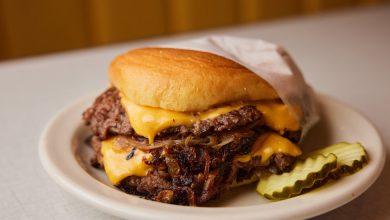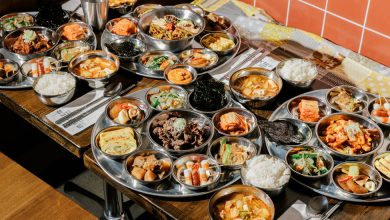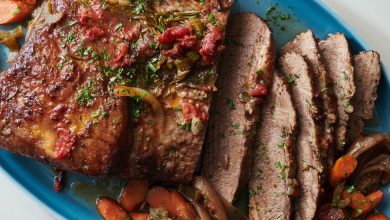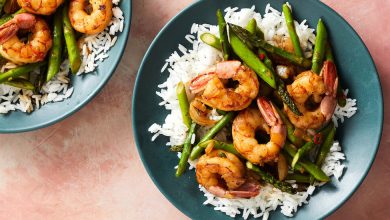For Those Who Feel Rejected by Family, Friendsgiving Can Be a Lifeline

Arnold Myint doesn’t have a coming-out story. His father, Win Myint, a mathematics professor at Tennessee State University, drove his son to ballet class and figure-skating competitions, and met young Arnold’s budding interests with encouragement.
“My coming-out story is that I never did,” the son said. “I was born and I was very open.”
Myint, 44, went on to become a chef, competing on “Food Network Star” and “Top Chef,” and opening several restaurants, including International Market in his hometown, Nashville. He remembers, as a child, roller-skating and running around with rice bags at the Thai restaurant his parents ran there, and finding inspiration in the cooking of his mother, Patti.
When Myint was in his 20s, his mother hosted large Thanksgiving dinners at their house. These gatherings of 30 to 40 guests included relatives and “people in Nashville who didn’t have a place to go, or students who couldn’t afford to fly home,” he said. “Everybody was always invited. It was a rainbow table” — a Friendsgiving of sorts.

“I’m the most comfortable in the kitchen,” said Arnold Myint, whose Friendsgiving table includes turkey, ham and a bounty of side dishes.Credit…Laura Partain for The New York Times
For many L.G.B.T.Q. people, the kind of embrace that Myint received from his family is unachievable, so they learn to adapt. The Friendsgiving celebrations they host or join can be a rainbow net cast in the dark.
The baker April Anderson, who with her wife, Michelle Anderson, owns the Detroit bakery Good Cakes and Bakes, said her past girlfriends were always a little shocked at how welcoming and accepting her family was at their Thanksgiving celebrations, a fact that she doesn’t take for granted.
“My side is a beautiful side, but I also know the other side,” said Anderson, 48. “I know so many people who have been put out, or 40- to 50-year-olds who have to live in the closet, waiting for their parents to die so they can come out.”
Friendsgiving is more than just a riff on Thanksgiving. It’s an opportunity to gather a family of like-minded people, some of whom may feel rejected by the households they grew up in. It also allows L.G.B.T.Q. people to make room for themselves to participate in traditions that might otherwise feel unwelcoming.
Tony Ortiz, a chef in Brooklyn, described this process as “removing the masks we wear outside of our community.” Ortiz added that “creating a space filled with good food and unrestricted joy, a space where we can be our authentic selves without holding back” is “a special kind of feeling.”
Friendsgiving, in this case, is not an alternative — it’s its own celebration of belonging.
“I think the idea of a Friendsgiving is very queer, especially when you consider how important chosen family is to the queer community,” said Ortiz, 30, who uses the singular they pronoun. “Not even important — oftentimes that’s all we have. So many of us aren’t able to build strong connections with our families because of our queerness. It makes me think about the strength of my bonds with my chosen family, how much deeper that connection is because of our shared identity. It can feel deeper than blood.”
Ordinarily, Ortiz would be celebrating Thanksgiving with their blood family on their grandparents’ ranch in Calaveras County, Calif., cooking three or four turkeys in an outdoor oven that their grandfather built. But this year, because of a busy schedule, Ortiz will be gathering with their chosen family in Brooklyn and making candied persimmons and calabaza en tacha, a Mexican candied pumpkin dish.
“I am fully expecting eight-inch heels and late-night D.I.Y. drag performances,” Ortiz said.
Also at this Friendsgiving dinner will be their friend Zacarías González, who will probably make a carrot flan. “I love what I grew up with dessert-wise,” said González, 37, who uses the singular they pronoun. But, they added, experimenting with different ways to interpret desserts from Latin American countries is part of the joy of Friendsgiving, a time to veer from traditional Thanksgiving dishes.
González has not had a Thanksgiving dinner with their parents in almost 20 years. González was disowned by them after coming out, at the age of 20.
In 2004, after moving to New York from Berlin, González came out to their mother over the phone. It didn’t go well, which wasn’t a surprise, González said, given their conservative Cuban upbringing. González’s mother said things like: “I don’t want this for you. Your life is going to be so hard.” Afterward, González’s father sent a short email instructing González not to reach out again unless they had received “treatment.”
Two months later, on Thanksgiving Day, González cooked a Friendsgiving dinner for 30 people in their new apartment in the Greenpoint neighborhood of Brooklyn. They made duck for the first time, an attempt to meld American dishes with not-so-American dishes. They found joy in old Food & Wine cookbooks. They blow-torched a meringue-topped sweet potato pie scattered with pie-crust maple leaves. Recently, they found old photos from this very first Friendsgiving. “It made me smile,” González said.
This year, González is especially looking forward to hosting Friendsgiving festivities in Brooklyn at Auxilio Space, an intersectional, food-focused community center they started with the chef Kia Damon and the artist Mohammed Fayaz. Auxilio is Spanish for “help,” and that’s the goal of the space, González said — to lend resources to “queer, Black, trans, and/or Indigenous communities of color.”
For many, Friendsgiving is a time not only to celebrate newfound bonds, but also to reject old culinary traditions that feel out of sync.
“My first Thanksgiving was with my family, but because we were immigrants, it was more of a novelty than anything else,” said Jon Kung, a chef and TikTok star. “I never discovered the gravity of the holiday until I started dating other men. They were bringing me home to their awkward family Thanksgivings.”
It wasn’t until their late teens that Kung, 37, who uses the singular they pronoun, discovered the untethered celebration of Friendsgiving. After immigrating from Hong Kong to Toronto, Kung moved to Detroit, where they found another kind of family while working at a gay bar called Gigi’s.
“Mohawk cherry brandy, that was our thing,” they said, referring to the shots that the staff’s rough, gravelly voiced “bar mom” would shout at them to take and go home. That was most nights. But on Thanksgiving, the employees at Gigi’s would gather around a table for dinner. “Because it was Detroit, it was a diverse crowd,” Kung said.
The food was not as diverse. The menu featured holiday staples like sweet potato pie and scalloped potatoes. All the drag queens would pitch in with cakes and pies. Since Kung wasn’t a cook back then, they brought cutlery — something to chip in. “It was that attempt to recreate the family Thanksgiving,” they said. “It just happened to be at our house bar.”
This year, Kung might make turkey congee at home in Detroit for Thanksgiving or spend the week in New York with their partner. “Friendsgiving was such a nice thing to have, but at the same time, Thanksgiving is not something I need,” they said. “It’s a huge part of Americana that I don’t feel a connection to. I never grew up here.” And while growing up, “my home life wasn’t great to begin with, so anything that’s more family-oriented I just don’t really feel a connection to.”
“Santa is not real and turkey is dry,” they added.
In 2018, the year Myint’s mother died, he held a Friendsgiving dinner at his new loft in Nashville. He had recently moved back there from Los Angeles to work with his sister, Anna, on International Market, a restaurant that pays tribute to the one their parents ran for 45 years.
Only his new neighbors came to that dinner, a departure from the lush Friendsgivings — like his mother’s — that Myint had ordinarily hosted.
“Being in America and in the South, my mom was always proud to celebrate Fourth of July and Thanksgiving,” he said. “Those were the two days she didn’t work.”
His mother always had to have a ham, he said. There was also a huge turkey with all of the sides, as well as mussels, shrimp cocktail and the dish everyone associated with Patti: sangkaya, a Thai egg-custard dessert that she slow-steamed in hollowed-out mini pumpkins, which could be eaten whole after finishing the caramel-laden wibble-wobble inside. “That was our pumpkin pie.”
Myint’s Friendsgivings today aren’t so different from those big Thanksgiving dinners with family. There’s just as much food, and the guest list is just as Technicolor. Over the years, it has included a parade of prominent people in the L.G.B.T.Q. community, including artist friends like Aurora Sexton, Brooke Lynn Hytes, Kameron Michaels, Manila Luzon, Raja Gemini and Trixie Mattel.
Myint, whose alter ego is a drag queen named Suzy Wong, comes back to how his parents always lifted him up — conjuring images of an idyllic home life that many are searching for at the Friendsgiving table.
“They’d come to my pageants and sit in the front row to watch me compete,” he said. “My dad was in a wheelchair at the time. When I was crowned Miss Gay America, he stood up and got up onstage with me. It reminded me of when I used to skate, but instead of skates, they were heels.”
Follow NYT Food on Twitter and NYT Cooking on Instagram, Facebook, YouTube and Pinterest. Get regular updates from NYT Cooking, with recipe suggestions, cooking tips and shopping advice.



